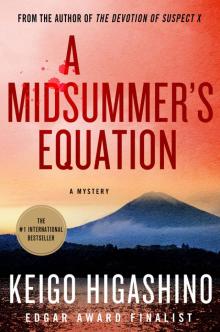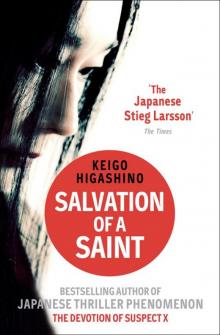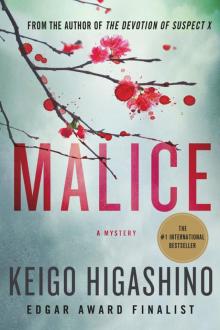- Home
- Keigo Higashino
A Midsummer's Equation: A Detective Galileo Mystery Page 2
A Midsummer's Equation: A Detective Galileo Mystery Read online
Page 2
“Some old man started yelling at me, and he helped me out, that’s all.”
“Oh,” Narumi said, wondering more about why the old man had been yelling at her cousin than anything else.
“Okay, so, see you later?”
She smiled at him. “I’ll be back in a couple hours, we can catch up then.”
Kyohei nodded and started walking up the hill. Narumi watched him go for a bit, then got back on her bike. She saw the man from the train waiting at the taxi stand. Too bad for him, she thought. The taxis came whenever a train was due, but there were only two or three of them in town. If there wasn’t one waiting there now, it would be a good thirty minutes before the next one showed up.
Narumi pedaled along the road paralleling the train line, enjoying the sun on her face. The sea breeze was tossing her hair around, but she didn’t mind. She’d kept her hair short for most of the last decade. It was a lot less trouble that way. Sometimes after a dive, she’d walk over to the bar and have a beer without even taking a shower. Guess I can’t really fault Mom for not wearing any makeup, can I?
Eventually, the road took a turn away from the coast and began to climb. Here there was a shopping center and a bank and a few other buildings, making it more of a proper town than the area near the station. A little further on, she came to the gray building which served as the local community center and the site of a very important hearing that day.
She parked her bike outside and took a look at the large tour bus sitting in the parking lot. She walked over until she could see the name by the bus’s door: “DESMEC.” That’s what everyone called them, but their official name was the Deep Sea Metals National Corporation. To Narumi, they were the enemy.
No one was on the bus, which meant they had already arrived and were getting ready. It’s on, Narumi thought, making a beeline for the entrance.
An official from city hall was checking people in at the door. Narumi showed her admission badge and walked to the lobby, where a large number of people had already gathered. Her eyes scanned the crowd until she heard someone calling out her name.
Motoya Sawamura, weaving between people, was striding toward her. His face and arms were darkly tanned. Since moving home from Tokyo last spring, Sawamura had been working at a home appliances store in town, and he did some freelance journalism on the side.
“You’re late,” he said as soon as he got close enough to be heard. “What were you up to?”
“Sorry. Is everyone else here?”
“Already inside. Come on.”
Narumi followed Sawamura into one of the waiting rooms off to the side of the main hall. She wondered what strings he’d pulled to reserve a whole room for their group on a day like today. There were already a dozen or so familiar faces gathered. Half the people were the same age as Narumi, while the others were older, in their forties or fifties. They came from a variety of occupations, but all were local residents. Some she had known from before, but most she only met through Save the Cove.
Sawamura took a deep breath and looked over the room. “The pamphlet I passed around has everything we’ve discovered through our research, and you can be sure that they’re going to say some things that disagree with our findings. That’s going to be the battlefield this war is fought on, so look out, and take notes, but keep your comments to yourselves. The real fight’s tomorrow. Today we listen to what they have to say, and tonight, we talk strategy. Any questions?”
“There’s nothing in here about the money,” one of the men said, holding up his pamphlet. He was a social studies teacher at the local middle school. “I’m sure they’re going to make a big point of the economic benefits their proposed development is going to bring to the community.”
Sawamura smiled at the teacher. “I didn’t feel the need to put it in there because that argument’s already so full of holes, we hardly need to poke new ones. The story changes every five minutes depending on who’s doing the talking. Yeah, they’ll bring it up again today, and I’m sure they’ll make it sound sweet, but anyone who thinks those benefits are coming their way is a fool.”
“The money’s not what’s important here,” Narumi chimed in. “Protecting the natural beauty of our coastline is. Destroy the environment, and you can’t put it back the way it was, no matter how many millions you throw at it.”
The social studies teacher shrugged at that, but was silent.
There was a knock, and the door opened. A man who worked at the community center poked his head in. “It’s almost time. If I could get you to move into the meeting hall?”
“Let’s go,” Sawamura said, sounding every bit the leader.
The chairs in the big hall were tiered, like bleachers. If they filled all of them, they could get four or five hundred people in here, Narumi thought. It had been built with the idea of welcoming speakers from other parts of the country, but as far as Narumi could remember, no one famous had ever come to give a talk in Hari Cove.
Narumi and the others from the group sat up front. She set her pamphlet on the table in front of her and got ready to take notes. Next to her, Sawamura was checking his audio recorder.
The seats in the large auditorium slowly began to fill. The mayor and a few other local officials were in attendance. She’d heard there would be people from the neighboring towns as well. The buzz had been building for days. Everyone was interested, and nobody knew anything—the perfect combination to fill a room.
As she was looking over the crowd, her eyes met a man’s eyes. He was probably a little over sixty, with gray hair parted down the middle and a white, open-collar shirt. The man smiled and nodded curtly in her direction. She nodded back, wondering who he was.
A narrow conference table had been set up on the stage, with a line of folding chairs behind it. Small nameplates in front of each seat listed a name and credentials. Most of the people were from DESMEC, but there were some independent scientists, too—an oceanographer and a physicist. A large screen hung on the wall behind the chairs.
Now the doors to the front of the hall opened, and men in suits came filing in, their faces hard. Someone from city hall silently led them to the stage.
A short distance away from the table was a chair for the emcee. A man with glasses, about thirty, picked up the microphone.
“It’s time, so we’d like to get things started. We’re still missing one participant, but he should be here any moment—”
The side door opened with a slam, and a man came dashing in, carrying his suit jacket over his arm.
Narumi noted with surprise that it was the man she’d seen at the station, the one talking to Kyohei. Sweat glistened at his temples. He must have given up on the taxi. It was a short distance from the station by bicycle, but quite a journey on foot.
The man sat down behind the nameplate that read “Manabu Yukawa, Assistant Professor of Physics, Imperial University.”
“Well, now that we’re all here,” the emcee resumed, “I’d like to begin this informational hearing concerning the development of undersea resources in the Hari Cove area. My name’s Mr. Kuwano. I’m in the Deep Sea Metals National Corporation’s public outreach office, and I thank you for your interest in our project. We’ll start with an overview from our technology division.”
A man whose nameplate announced him as a manager in DESMEC’s technology division stood as the lights in the room darkened. The words “Developing Undersea Resources” appeared on the screen in giant, bold letters.
Narumi straightened in her chair, not wanting to miss a word. She knew that protecting the ocean was her job. No one would do it for her. And if she failed, the natural jewel that was Hari Cove would be torn apart in the name of economic progress.
It had all started with a report from the committee of natural energy resources at METI—the Ministry of Economy, Trade, and Industry—that had shocked Hari Cove and the surrounding towns. The report stated that the region of the sea beginning a few dozen kilometers to the south had been selected as a t
op candidate for testing the commercial viability of developing hydrothermal polymetallic ore.
This ore was found in lumps of rock that formed in the sediment around hydrothermal vents on the seabed. They contained copper, lead, zinc, gold, and silver, as well as rich deposits of the rare metals germanium and gallium. Were it possible to recover these rare metals, then Japan would go from resource-poor to resource-rich overnight. The government was putting a lot into the development of the necessary technologies, with DESMEC leading the charge.
This latest finding had generated such excitement because it was at the relatively shallow depth of eight hundred meters. The shallower the water, the easier and cheaper recovery would be. That it was only a few dozen kilometers from land also improved the viability of the site.
When the report made the rounds, Hari Cove and the towns nearby had erupted—not with anger over the coming destruction of the natural habitat, but with excitement at the prospect of a new industry and the jobs it would bring.
THREE
I don’t remember this hill being this long, Kyohei thought with a sigh, stopping to look around. The best swimming in the area was down by the station, so he’d been up and down this road a hundred times in a car, but this was his first time walking it.
The scenery hadn’t changed much in two years. A large building—a former hotel—squatted at the bottom of the hill. The roof and walls were a sooty gray, and all the paint had flaked off the large sign out front. His father liked to call it “the ruins of Hari Cove.”
“Why isn’t anyone living there anymore?” Kyohei had asked once as they were driving by.
“It used to be a fancy hotel,” his father had told him. “But people stopped coming, and they couldn’t keep it open.”
“Why’d they stop coming?”
His father shrugged. “Probably because there were better places to go.”
“What kind of better places?”
“You know, fun places. Like Disneyland, or Hawaii.”
Kyohei had never been to Hawaii, but he was a fan of Disneyland. People got jealous when you told them you were going to Disneyland. No one got jealous when you were going to Hari Cove.
Kyohei resumed his climb. He started to wonder why anyone had ever built such a big hotel in a little town like this. He wondered if it had ever really been as popular as his dad claimed.
Finally, he spotted the inn. It was only about a quarter the size of the ruins below, but it wasn’t any newer. Kyohei’s uncle, Shigehiro, had taken it over from his father fifteen years ago, but he hadn’t done any renovations in all that time. “I got a renovation idea,” Kyohei’s father had joked. “Tear the place down. No one ever comes here anyway.”
Kyohei slid open the front door and stepped inside. The air-conditioning was running full blast, and it felt good. He shouted, “Hello?”
The curtain behind the counter moved, and his aunt, Setsuko, emerged with a big smile. “Kyohei, you made it! My, but you’ve gotten so big!” she said, echoing Narumi’s greeting. Maybe they think that makes kids happy, Kyohei thought.
“Thanks for putting me up,” Kyohei said, remembering his manners.
His aunt chuckled. “Now, now, none of that. You’re family. Come right on in.”
Kyohei took off his shoes and put on a pair of the guest slippers they had lined up at the entrance. The inn may have been small, but there was a lobby, complete with a wicker bench.
“It must’ve been hot out there! I’ll get you something cool to drink. Juice? Tea? I think we have some cola.…”
“Cola!”
“Thought so,” Setsuko said, giving him another smile and disappearing behind the counter.
Kyohei dropped his backpack and sat down on the bench. His eyes started to wander around the room. There was a framed painting of the sea from what looked like the nearby coast. Next to it was a map with little illustrations showing local spots of interest, except the map was faded so badly he could barely make anything out. An old clock on the wall showed the time was two o’clock.
“Hello there, Kyohei,” came a gravelly voice, and his uncle Shigehiro appeared. “Good to see ya!”
His uncle hadn’t changed much in the last two years either. He was still plump as a Buddha, but his hair was thinner now, making him look even more like a Buddha. The only real difference was that now he was sporting a cane. “Because he got too fat for his knees to hold him up,” Kyohei’s father had said.
Kyohei stood and said hello.
“Sit down, sit down. I’ve got a mind to sit down right there with you,” Shigehiro said, sitting down across from Kyohei and chuckling. He had a big grin on his face. A happy Buddha, Kyohei thought. “So, how’re your parents?”
“Busy, like always,” Kyohei said.
“Busy’s good.”
Setsuko came out with a tray carrying a teapot and three glasses, one already filled with cola.
“Hey, no cola for me?” Shigehiro asked with a frown.
Setsuko shook her head. “It’s barley tea for you, mister. You have to watch your sugar,” she said, pouring him a glass.
Kyohei drank his cola, grateful for the cool sweetness after the long climb.
Setsuko was Kyohei’s father’s older half-sister. Setsuko’s mother had died in a car accident when she was still little. Her father later remarried and had Kyohei’s father, hence the nine-year difference in their ages.
“I saw Narumi at the station,” Kyohei said. “She said she was going someplace?”
“Eh? Where’s Narumi off to now?” Shigehiro asked his wife.
“Oh, you know,” she said, “that thing about the cove. They’re talking about digging up gold and silver and the like out there.”
“Oh, right, that,” Shigehiro said, utterly uninterested. “Sounds like a bunch of hogwash to me. Digging up gold from the ocean.”
“I wouldn’t know about these things,” Kyohei’s aunt said with a shrug. “Narumi was pretty worried that if they started working out there, the sea would get all dirty, you know.”
“Well, she’s right to worry about that,” Shigehiro said, a bit more seriously. He took a long sip of his tea.
“Oh, I almost forgot,” Kyohei said, opening his backpack and taking out the paper-wrapped package inside. “Mom wanted me to give you this.”
“Oh, she shouldn’t have,” Setsuko said, smiling even as she furrowed her eyebrows. She began opening the package immediately. “Look at this, tsukudani beef jerky. Oh, I’ve heard of this shop. It’s famous! She really shouldn’t have. I’ll have to call and thank her.”
Kyohei finished his cola, and his aunt immediately asked if he wanted a refill. “Yes please,” he said, and she swept his glass away. That was a nice change of pace. At home, he would’ve been told to get it himself, if they let him drink cola in the first place.
Maybe spending the rest of summer vacation in Hari Cove wouldn’t be so bad after all.
FOUR
A manager from DESMEC’s development division stood next and began to talk about their coming plans in detail. First, they would conduct a survey of the seabed to determine the amounts and densities of the various ores, as well as their metallic content. At the same time, they would be working on specific new technologies for extracting and removing the ores. There would be more investment into smelting technology as well, up until the point at which they were ready to assess the site for potential commercialization within a ten-year time frame.
Narumi felt somewhat relieved, if only because they were avoiding the kind of vague, saccharine promises they had heard too often. Things about “new industry lifting up the local economy.” To the contrary, the development manager’s talk made it clear there were still many unknowns, and they were proceeding with care.
Yet there was a magic to the words “undersea resources” that made people dream big, as if gold and silver really would come erupting out of the sea to shower the community with riches. To those primarily concerned with invigorating the local e
conomy, it seemed like a godsend at a time when the town sorely needed one. Year by year, Hari Cove had been slowly falling apart. The tourism industry, their main source of income, had been in recession for some time and showed no signs of picking up.
Yet that didn’t mean they should give carte blanche to some unknown technology. Hari Cove lived and died by the ocean. And if that ocean wasn’t brimming with beauty and life, neither would the town. Sacrificing the ocean in order to save the town was a fool’s bargain.
Narumi realized early on there wasn’t much she could do about it all by herself, so she launched a blog, becoming the unofficial spokesperson for the sea near Hari Cove. One of the first people to e-mail her after the blog went up was Sawamura. He had been focusing on articles about natural preservation efforts in the area and had reached out to his environmentally minded friends. Save the Cove was their idea. Narumi had been invited along for the ride.
She had responded almost immediately. If anyone was doing something to save the cove, she wanted in.
So began long days of exchanging information and research. Sawamura sold his apartment in Tokyo and came back home so he could be on the front lines. Drawing on his connections, they found more people willing to help their efforts, but things really took off when their central message, that the mining would disrupt the cycle of life in the nearby ocean, struck a chord with the local fishermen. After that, the fishermen started showing up to meetings in larger and larger numbers.
Finally, the government took notice. METI directed the organizations involved with the mineral surveys to hold an informational hearing—a huge coup for the Save the Cove movement, and Narumi’s big chance. She could get the word out officially now.
Up on stage, the DESMEC engineers were still talking. They explained at length the measures they would take to protect the environment, but nothing passed the sniff test for Narumi. It took two hours before they were finished with their presentation, after which there was a Q and A.

 A Midsummer's Equation: A Detective Galileo Mystery
A Midsummer's Equation: A Detective Galileo Mystery The Devotion of Suspect X
The Devotion of Suspect X Journey Under the Midnight Sun
Journey Under the Midnight Sun The Name of the Game Is a Kidnapping
The Name of the Game Is a Kidnapping Salvation of a Saint
Salvation of a Saint The Miracles of the Namiya General Store
The Miracles of the Namiya General Store Malice: A Mystery
Malice: A Mystery